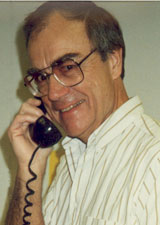Volume 26 · Number 2 · Winter 2009
In Memoriam: Professor August "Gus" Maki
[written by his colleagues]

Professor August "Gus" Maki's scientific career was largely focused on magnetic resonance spectroscopy studies of chemical and biological species with unpaired electrons, so-called "paramagnetic" systems. In his graduate work at UC Berkeley with Professor Bruce McGarvey and in his early independent career at Harvard and UC Riverside, he used electron paramagnetic resonance (EPR) to measure detailed properties of metal ions such as copper bound into well-defined chemical complexes. This work helped transition EPR spectroscopy from being a tool primarily used by solid-state physicists into a tool widely used by chemists and biologist.
Professor Maki helped develop this spectroscopic method further. For example, in collaboration with James Hyde at Varian, he developed the first use of a method called electron-nuclear double resonance to probe the chemical environment of unpaired electrons (radicals) in organic compounds in solution. At UC Davis (where he moved in 1974) he further developed optically detected magnetic resonance (ODMR) methods to provide extremely sensitive detection of paramagnetic species (or unpaired electrons) in proteins. He was able to use this method a biochemical probe, for example, in understanding how certain amino acids such as tryptophan in DNA binding proteins can insert itself physically between the planes of DNA bases.
Professor Maki also provided training in physical chemistry to generations of UC Davis students, including his own Ph.D. students and postdoctoral researchers. He helped form a core of the strong magnetic resonance research that is still very active in the chemistry department at UC Davis. He became an emeritus professor 1994. In 2000, he was elected a fellow of the International EPR Society in recognition of his many contributions to the field.
« Back to News & Notes In Memoriam
